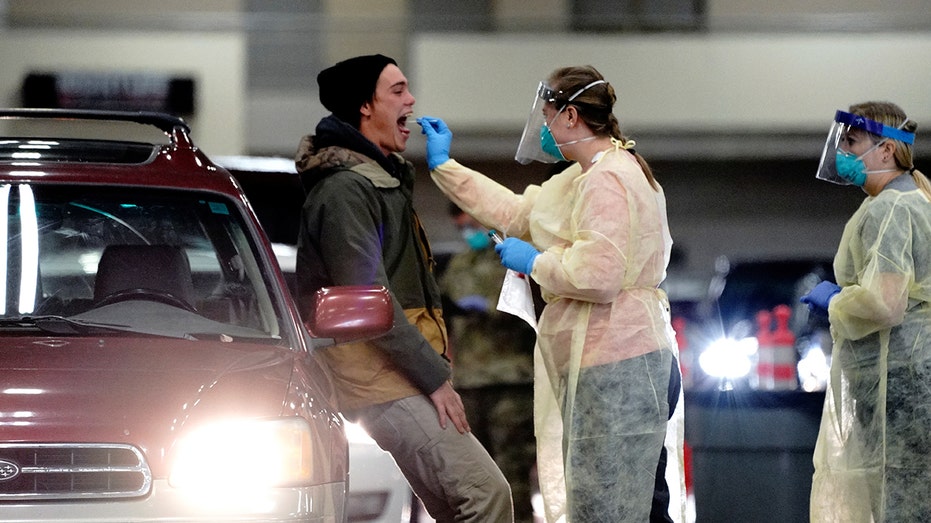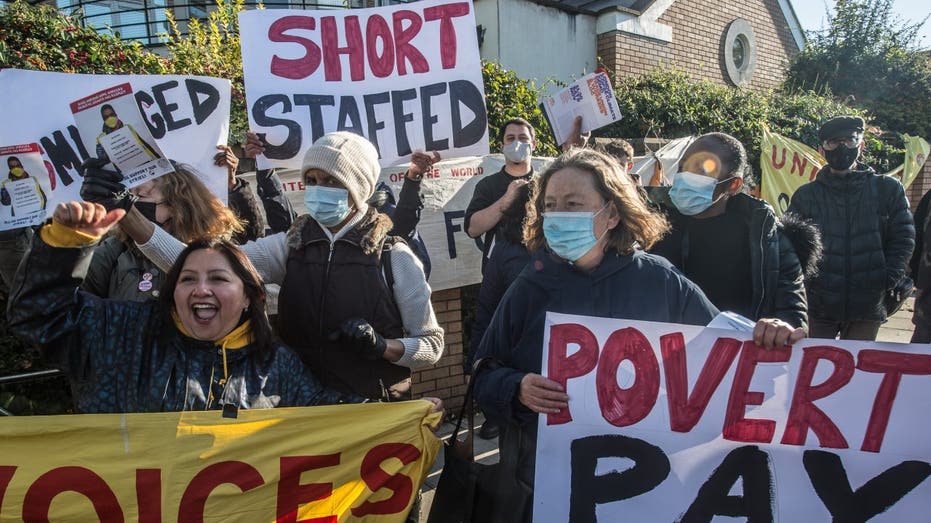
Although the research was conducted on healthcare workers, the study’s authors say the lessons can be applied to any profession.
Researchers are looking into new ways to fight burnout, and one possible solution is simpler than you might think. A new study says thinking positively for just a few minutes daily can improve your long-term mental health.
It can be something kind you’ve done for someone, or something beautiful you’ve seen, like a sunset.
The study focused on people who have been particularly busy the past couple of years; health care workers.
“Two out of three of our colleagues are drowning in the water right now and they need a life preserver,” said Dr. Bryan Sexton, the Director of Duke’s Center for Healthcare Safety and Quality.
WARNING SIGNS OF SUICIDE: WHAT TO KNOW ABOUT PREVENTION, RED FLAGS AND HOW TO DEAL WITH THE ISSUE

Workers, left, change their medical gloves as people are tested for COVID-19 at a walk-up testing site at Farragut Square, Thursday, Dec. 23, 2021, just blocks from the White House in Washington. (AP Photo/Jacquelyn Martin / AP Newsroom)
Dr. Sexton was the lead investigator for the study. He says many healthcare workers feel burnt out, especially after a busy couple of years of pandemic care, and now a nasty mix of Covid and flu cases.
He created a handful of tutorial videos explaining simple ways to think or act in positive ways. The videos are on his EdMedX Youtube channel. The study’s participants applied the tips to their everyday work life.
“The actual activity can take anywhere from 2-7 minutes,” Sexton said.
TEACHERS ORGANIZATION FOCUSES ON MENTAL HEALTH NEEDS FOR EDUCATORS

A person receives a throat swab from a healthcare worker at a drive-thru testing site inside the Bismarck Event Center as the coronavirus disease (COVID-19) outbreak continued in Bismarck, North Dakota, U.S., October 26, 2020. (Reuters/Bing Guan / Reuters Photos)
One lesson encourages you to remember a time you were in “awe” of somewhere beautiful.
“Awe expands your sense of time. You will feel like you have more time available,” he says in one of the videos, which are posted on YouTube.
The idea might sound simple, but the data says it works. Researchers showed the lessons to 480 healthcare workers and then measured their emotional exhaustion in the following months.
After one month, burnout improved. And it kept improving for a year, which is when the study ended.
“I think Dr. Sexton’s work really helped me to add micro-meditations in the middle of all of my work,” said Dr. Genie McPeek Hinz, who participated in the research.
“You just don’t have time to take care of yourself,” McPeek Hinz said.
EARLY, SURPRISING SURGE OF RSV IN KIDS HAS HOSPITALS, MEDICAL CENTERS CONCERNED

LONDON, ENGLAND – OCTOBER 21: Striking workers stage a picket outside the SAGE care home in Barnet on October 21, 2021, in London, United Kingdom. Carers, domestic, and maintenance workers at SAGE Nursing Home in North London are taking strike action (Guy Smallman/Getty Images / Getty Images)
Dr. Sexton says it’s crucial that health care workers take care of themselves, because that stress should not be passed on to patients.
“Emotional exhaustion is directly linked, not only to medication errors, but delays in delivery of care, communication breakdowns, disruptive behaviors, and risk-adjusted mortality rates,” Sexton said.
CLICK HERE TO GET THE FOX BUSINESS APP
Although the research is over, Duke is hosting periodic mental health sessions that are free for all U.S. healthcare workers. The next sessions are in January.
Although the study focused on healthcare workers, Sexton says these tools can be applied to any profession, and to anyone feeling burnt out.

 Latest Breaking News Online News Portal
Latest Breaking News Online News Portal




